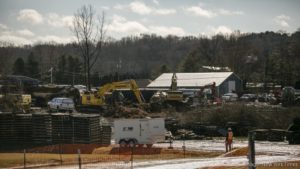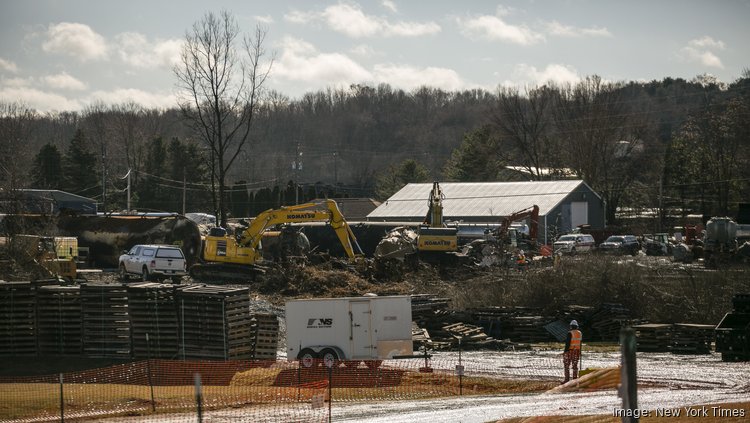Article published in the Philadelphia Business Journal on February 27, 2023. Updated 7:00 am.
The Feb. 3 derailment of a Norfolk Southern freight train in the village of East Palestine, Ohio raises the question—does Norfolk Southern consider avoidance of derailments to be mission critical?
The derailment caused a fire and the release of vinyl chloride, a flammable toxic chemical. It’s a known carcinogen that can cause liver, brain, and lung cancer, as well as leukemia. Vinyl chloride is used in the manufacture of all types of PVC plastic consumer and industrial products and is a building block of modern society.
Residents of East Palestine who were in close vicinity to the derailment were ordered to evacuate. Two days later, due to the growing possibility of an explosion, Mayor Trent Conaway issued a broader evacuation order for residents living within a one mile radius of the derailment. This evacuation order covered about half of the village’s 4,700 residents. To avoid an explosion, a controlled burn of tank car contents was conducted, but released toxic fumes into the air.
Cincinnati temporarily stopped sourcing Ohio River for its municipal water system due to contamination concerns from the derailment. A number of East Palestine residents complained of breathing difficulties, eye irritation and headaches. This is what happens when a railroad doesn’t view safety as a mission critical imperative.
The National Transportation Safety Board stated that an overheated wheel bearing caused the derailment and confirmed that the derailed train was not equipped with an Electronically Controlled Pneumatic braking system.
ECP applies the brakes of each rail car simultaneously rather than sequentially with conventional air brakes, which reduces the likelihood of rail cars jackknifing and derailing.
The November 2007 edition of NS Newsbreak, a publication of Norfolk Southern Railway, touts the railroad’s first use of electronically controlled pneumatic brakes. Quoting the publication:
ECP brakes have the potential to reduce train stopping distances by as much as 60 percent over conventional air brake systems. ECP brakes utilize electronic signals to simultaneously apply and release [brakes] throughout the length of a freight train. This differs from a conventional braking system in which each car brakes individually as air pressure moves in a series from car to car.
The Federal Railroad Administration has authorized Norfolk Southern …to equip and test certain locomotives and freight cars with ECP brakes for their potential to shorten stopping distances and improve railroad and public safety, network capacity and efficiency, asset utilization, fuel savings and equipment maintenance.
So, why wasn’t the derailed Norfolk Southern train equipped with ECP brakes?

In 2015, the Obama Administration issued a federal regulation requiring all freight trains carrying crude oil and hazardous chemicals to utilize ECP braking technology. This initiative was undertaken after a number of serious derailments in both the U.S. and Canada. The derailed train hauling vinyl chloride was not included in this regulation. Given the magnitude of damage the derailment caused, it should have been.
Due to fierce opposition to ECP by the Association of American Railroads and other industry groups, Congress issued a mandate to the Department of Transportation to do a cost/benefit analysis of ECP braking technology.
The study “determined that the expected benefits, including safety benefits, of implementing ECP brake system requirements do not exceed the associated costs of equipping tank cars with ECP brake systems, and therefore are not economically justified.”
The economic analysis did not sufficiently weigh the damage to people and communities that derailments could cause. The ECP brake system regulation was scrapped in 2018 by the Trump administration, allowing railroads to operate trains with the less safe conventional air brake system.
Beyond straight economics, railroads need to consider the adverse toll on people, the cost of cleanup, lawsuits and federal government fines, as well as the reputational cost to the company. They need to deploy ECP on all their trains that transport hazardous and flammable cargo. The Biden administration should mandate it.
Given Norfolk Southern’s strong endorsement of ECP in their 2007 NS Newsbreak publication, why didn’t the company deploy them after the Department of Transportation mandate was scrapped in 2018?
Norfolk’s commitment to safety is stated in their publication titled, “Safe Tracks, Safe Towns.” It reads:
At Norfolk Southern, nothing is more important than the safety of our employees and the public. Our team of qualified professionals, state-of-the-art equipment and infrastructure, and close community connections ensures safe and reliable rail service everywhere we go.”
To the residents of East Palestine, this commitment rings hollow. The airline and auto industries approach safety as a mission critical imperative. The railroad industry should have the same mindset.
Stan Silverman is founder of Silverman Leadership and author of “Be Different! The Key to Business and Career Success.” He is also a speaker, advisor and widely read nationally syndicated columnist on leadership. He can be reached at Stan@SilvermanLeadership.com.

